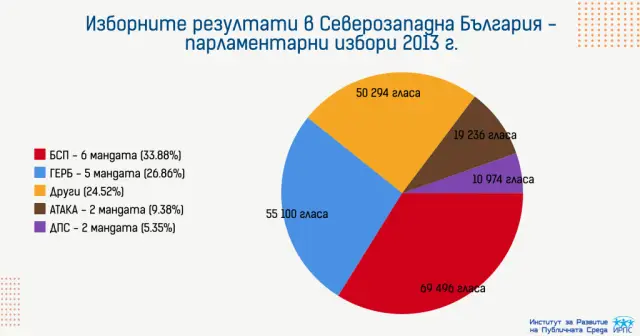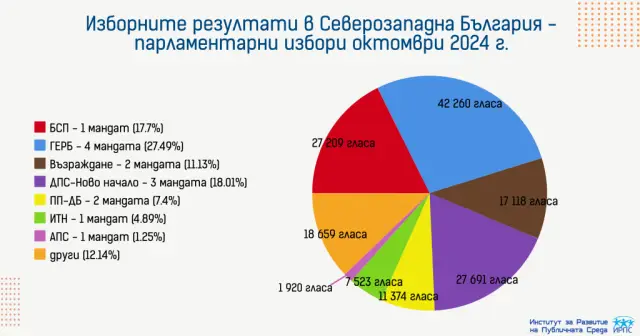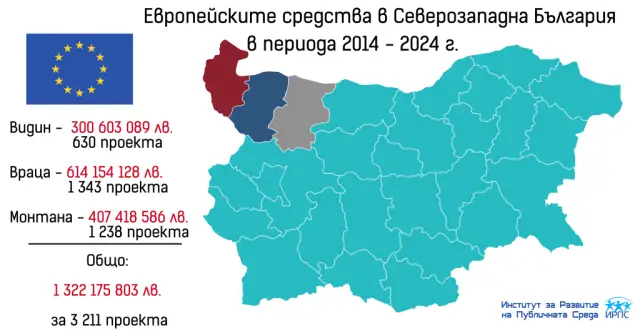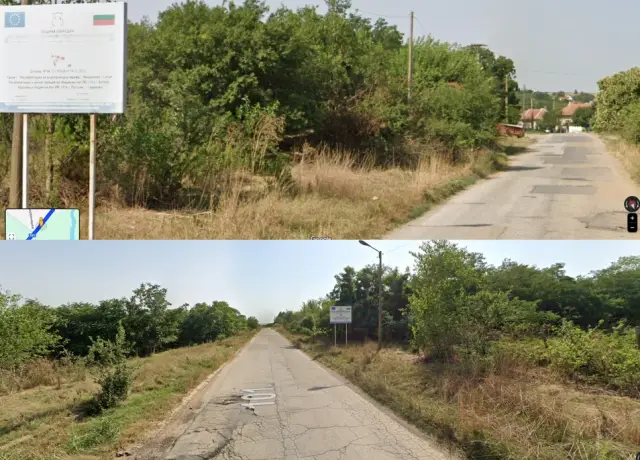Analysis by the Institute for Development of the public environment
Northwestern Bulgaria is the poorest region in the European Union. Official statistics show that in the districts of Vidin, Vratsa and Montana, the population has decreased by 63 thousand people in the last 10 years. A large part of the municipalities in these areas are among the last places in terms of economic indicators, and unemployment is twice the national average.
In the light of the past early parliamentary elections for the three regions, there was talk again along the lines of election violations, controlled vote and the increase of support for Delyan Peevski's formation – DPS-New beginning. In this campaign, we also witnessed massive actions by the Ministry of Internal Affairs in these areas, aimed at combating voting under pressure. The success of these actions of the police is contested by a number of parties, and we are also yet to see an analysis of the ministry on the subject. The fact is that even the Minister of Internal Affairs himself admits that those involved in election violations have long been known to the law enforcement agencies.
However, is there a change in the dynamics of votes in Vidin, Vratsa and Montana? What is she like? Did it happen only in the last election or is it a longer-term process, also showing the differences in the degree of commitment of the political parties to the citizens in these areas? This is what we will present in the current publication of the Institute for the Development of the Public Environment.
Political biases in the Northwest in the last 10 years
After the first years of the transition, the electorate in Northwestern Bulgaria largely continued to support the socialist party. And in 2013, the majority of voters in Vidin, Vratsa and Montana regions still supported the BSP (33.9% of all votes in the three regions). Then, 6 out of a total of 15 mandates were for MPs nominated by her. The support for GERB brought them 5 parliamentary seats. At that time, the Ataka parties (collected 9.4% of the votes) and DPS (with 5.4% of the votes) had two people's representatives in total from the three regions. You can see detailed information about the votes and the distribution of mandates in the regions of Vidin, Vratsa and Montana in the 2013 elections in the following graph:

In the other column, the data for all other political formations that participated in the pre-election race in the three regions, but did not manage to win a mandate from them, are collected.
Eleven years later, political leanings have changed significantly. Support for the BSP has more than doubled to 27,000 votes, and the party now receives only one mandate from these districts. GERB, on the other hand, have 27.5% or 42,260 votes, which is equivalent to 4 parliamentary seats. On the political scene, the DPS-New Beginning is already establishing itself as a major player – the faction around Delyan Peevski. It managed to achieve significant electoral success and received almost 28 thousand votes, which is 2.7 times more than DPS in 2013. The new beginning will be represented by three deputies in the 51st parliament. Support for far-right parties has shifted to Vazrazhdane, which received 11.1% and two people's representatives. The PP-DB coalition also has quite a few sympathizers – 16.8% of the votes and two mandates. Alliance for Rights and Freedoms and There is such a people take one mandate each from Northwestern Bulgaria.
Due to the reduced population of the three regions, the deputies they broadcast after 2023 are a total of 14 (with one less for the Montana constituency).
Detailed information about the votes and the distribution of mandates in the districts of Vidin, Vratsa and Montana in the last parliamentary elections can be seen in the following graph:

In 2013, there were a total of 205,100 voters in the three districts. Their number has decreased by almost 50,000 people in the October 2024 elections (a total of 153,756 voters). Thus DPS-New Beginning managed to increase its support compared to that of DPS before the split in the party and despite the general decline in voter turnout.
European funding in the North West
And while in the last ten years both the activity and the population in the North-West are decreasing, the funds invested by the European funds in the three regions to overcome the negative demographic and economic trends are increasing.
In the period 2014-2024, according to the data of the Information System for the Management and Monitoring of EU Funds, investments in the Vidin, Vratsa and Montana regions amount to a total of BGN 1,322,175,803. This is the free funding for a total 3,211 projects on the territory of these regions. The largest number of contracts were concluded in Vratsa – 1,343 for BGN 614 million, followed by Montana – 1,238 projects for BGN 407 million and Vidin – 630 projects for BGN 300 million. Information on European funding is presented in the following graph:

Funds from European programs are usually used to solve problems in areas where there is a lack of national funding – the construction of wastewater treatment plants, the renovation of social infrastructure and the increase of the capacity of the local and central administration.
But issues of control over the use of these resources, which beneficiaries have access to them and whether they are being used as intended have often been on the agenda. In this regard, below we present how the funds from the European funds are invested in Hayredin municipality (Vratsa region). With a population of about 4,000 people and 6 villages in its composition, in the period 2014 – 2024 Hayredin received a little over BGN 15 million in grant funding from the EU for 34 projects. One of them is for repairing the road infrastructure:

It is properly labeled according to EU requirements, but serious doubts are raised about the quality of the repair works. The total amount for projects specifically for road infrastructure in the municipality is BGN 3.1 million. These are significant funds, especially against the background of the economic situation in this region. They could have a very positive impact on improving the living conditions of the people there if used as intended.
The lack of a competitive environment, high unemployment rates, low economic indicators, poverty and demographic collapse are among the problems that residents of the Northwest face on a daily basis. Indicative in this regard are the amounts that the municipalities in the three regions finance with European funds under programs such as “Hot Lunch”. In the Vidin region, 28 such contracts were concluded for a total of BGN 11.56 million, in Vratsa – 30 contracts with a total value of BGN 20.45 million and in Montana – 29 projects for BGN 5.79 million. In Boinitsa municipality (Vidin region) from 2017 to 2025, about BGN 710 million have been approved so that the local government can “meet the food needs of people who cannot to provide it themselves”. According to the data of DG GRAO, the population of the municipality at the end of 2023 is 919 people.
Municipalities applying for the program indicate the “social-demographic and economic picture” of municipalities, factors such as “social exclusion of persons, disadvantaged families and old people in need of support and social services”, “poverty level and income – permanent lack of property and permanent income, unemployment, low pensions and insufficient income” etc.
At the same time, it is precisely in the poorest municipalities that the trend of mayors staying in their posts for the longest time, of missing investors, of the public sector, which is the main employer there, is observed.
The different speed of development in the Bulgarian municipalities is a sustainable process that has already caused severe consequences for part of the population in some regions of the country. Among them are long-term unemployment, high levels of poverty, refusal to continue education, retraining, etc. In this sense, the fact that in some settlements poverty has long become a hereditary phenomenon is worrying. The quality of life of the citizens certainly gives rise to changes in their attitude towards politics. Systemic deprivation, for example, often leads to disengagement from public affairs because people focus on solving their most pressing problems. The ultimate political result of this is related to the ever weaker knowledge and trust in democratic institutions and rules.
Particularly the political parties are the ones who must undertake to restore the broken relationship with the voters, by addressing the essential problems of the people in places, ensure real interaction between the representatives of the authorities and the voters, promote their democratic culture, etc.
